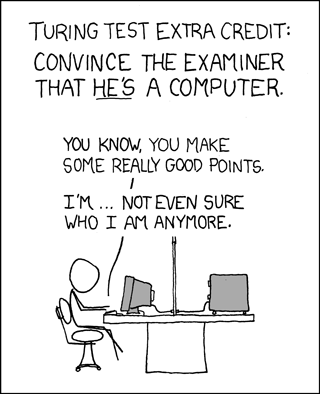Eugene Goostman, a chatbot with the personality of a 13-year-old boy, won the biggest Turing test ever staged, on 23 June, the 100th anniversary of the birth of Alan Turing.See also Saturday's:
Held at Bletchley Park near Milton Keynes, UK, where Turing cracked the Nazi Enigma code during the second world war, the test involved over 150 separate conversations, 30 judges (including myself), 25 hidden humans and five elite, chattering software programs.
By contrast, the most famous Turing test - the annual Loebner prize, also held at Bletchley Park this year to honour Turing - typically involves just four human judges and four machines.
"With 150 Turing tests conducted, this is the biggest Turing test contest ever," says Huma Shah, a researcher at the University of Reading, UK, who organised the mammoth test.
That makes the result more statistically significant than any other previous Turing test, says Eugene's creator Vladimir Veselov based in Raritan, New Jersey. "It was a pretty huge number of conversations," he said, shortly after he was awarded first prize: "I am very excited."
First conceived by Turing in the early 1950s, the test is the most famous evaluation of machine intelligence. Human judges converse via a text interface with both hidden bots and humans - and say in each case whether they are chatting to a human or machine.
Turing said that a machine that fooled humans into thinking it was human 30 per cent of the time would have beaten the test. Just short of this, Eugene fooled its judges 29 per cent of the time. In a close second place, came JFred, the brain child of Robby Garner, and in third place Rollo Carpenter's Cleverbot. The other two bots to compete were Ultra Hal and Elbot....MORE
How to Solve Today's Alan Turing Google Doodle
And from the genius that is xkcd:
